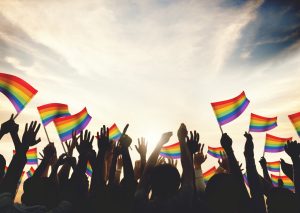 I will be coming out for the rest of my life. No setting is safe from this phenomenon. I have to come out everywhere – in the grocery store, at work, when meeting a friend of a friend. The process of coming out is lifelong and dynamic, despite the well-known concept of “a coming out story” narrowing this down to a specific moment in time.
I will be coming out for the rest of my life. No setting is safe from this phenomenon. I have to come out everywhere – in the grocery store, at work, when meeting a friend of a friend. The process of coming out is lifelong and dynamic, despite the well-known concept of “a coming out story” narrowing this down to a specific moment in time.
Sharing initial coming out stories is a deeply cultural act within the LGBTQ community, and an incredibly important one at that. This first coming out is unavoidable; it is the one universal act faced by every member of our community. When we share these stories, we are bound together in our experiences, negating our differences. Through these stories, we are able to connect, relate and empathize. From beautiful moments of unconditional acceptance to the unforgettable pain of being rejected or shamed, telling these stories is a way to reveal a core part of what brought us to who and where we are in the present.
I remember exactly how it felt when I finally gathered the courage to speak my truth out loud for the first time. Saying those words was empowering and exhilarating, but even more than that – it quelled the fear I carried around for so long up until that point. With this weight off my shoulders and a newfound sense of confidence, I continued to share. Barring a few unexpected and rejecting responses, the reactions I received were breathtaking.
At the time, it didn’t cross my mind that letting my own little world know who I was wouldn’t then translate to the rest of the world knowing as well. I was so focused on the present; I never stopped to ponder what coming out would mean on a larger scale. It was only as my life progressed, when coming out became a part of my, sometimes daily, repertoire, that I realized my queerness was something I would have to reveal again and again, without reprieve.
Coming out is an art. If our world were safer, kinder or more accepting, it wouldn’t have to be so. Unfortunately, safety, kindness and acceptance are non-negotiable concepts to consider whenever coming out. How will this person react? Will a negative reaction have any repercussions for my spouse or myself? Am I feeling strong enough in this moment to handle any reaction that comes my way? These questions are now as second nature as breathing when these moments face me.
Often I see giving this knowledge as a privilege. Sharing this intimate detail, though so core to my existence, means giving trust to the other person, believing that they will receive the information in a positive way and never use it to hurt me. On the other end, there are times when I spring out of the closet to make a point – to challenge a homophobic comment or give a queer face to a situation that desperately needs humanizing.
Then there are the times when I stay quiet. These moments require much navigation – such as when I am trying to explain why we moved to San Diego for a better and safer life after the politic shift, without bringing up how laws impacting transgender people and the LGBTQ community personally impact me and my family. Times like this can lead to feelings of invalidation, when it is assumed I am straight or cis, when this part of my identity is scratching inside me, begging to be seen, heard and validated.
This is the balancing act that I, as a queer person, must maintain. This is a part of my life, of my story. I wouldn’t trade my queerness for anything. I will never stop coming out. I will be safe, I will be thoughtful, but I will never be ashamed. For every person I have lost, I have gained so many more in their place who are filled with love and gentleness. For every reaction of hate I have witnessed or experienced, there have been moments of acceptance and understanding that carry so much more weight. I choose to live in this light, in this hope, glass half full and heart open.











